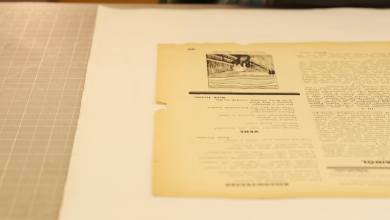He Taught Ancient Texts at Oxford. Now He Is Accused of Stealing Some.

He had impeccable credentials. No one disputes that.
Dirk Obbink was an esteemed lecturer at the University of Oxford. He had received a MacArthur Foundation grant in 2001 for his work with papyrus, and held a prominent post helping to run the Oxyrhynchus Papyri — the world’s largest collection of ancient papyri, held by the Egypt Exploration Society and housed at Oxford’s Sackler Library.
So roughly a decade ago when the craft shop chain Hobby Lobby began to build a collection of ancient artifacts related to the Bible, it made sense to touch base with Obbink.
Hobby Lobby’s president, Steve Green, was leading an effort to create a national museum that focused on the Bible. So between 2010 and 2013, the chain says it paid about $7 million dollars to Obbink for seven batches of antiquities including ancient papyri with New Testament writings.
Some of those artifacts, according to the Exploration Society, would end up at the Museum of the Bible, which opened in Washington four years ago.
Now, Hobby Lobby is suing Obbink, saying that 32 items it bought from him were stolen from the Exploration Society, which identified some of those artifacts as having come from its collection at Oxford.
Obbink has since parted ways with the university and could not be reached for comment. But he has denied having taken anything from the Exploration Society’s collection. In 2019, he told The Waco Tribune-Herald: “I am aware that there are documents being used against me which I believe have been fabricated in a malicious attempt to harm my reputation and career.”
The suspicions remain, though, and the Exploration Society has banned Obbink from access to the Oxyrhynchus collection.
It is an understatement to say that the dispute over Obbink and the papyrus has shaken a scholarly world where ancient texts are entrusted to a set of experts whose erudition and experience have singled them out as special.
Obbink had been considered as one of that breed.
“He was recognizable very early on in his career as a brilliant philologist and a capable papyrologist with a wide range of interests and a lot of energy,” said Roger Bagnall, a widely respected classics scholar who was at Columbia University when Obbink joined the faculty.
Obbink was known for an ability to piece together and decipher fragmentary texts. The MacArthur Foundation called him an “expert in the art and craft of rescuing damaged ancient manuscripts from the ravages of nature and time,” adding that his work “requires diligence, knowledge of different dialects of ancient Greek, and the ability to decipher cursive abbreviations scrawled in margins.”
When Obbink left Columbia for Oxford in 1995, he gained access to the Oxyrhynchus collection, with more than 500,000 fragments of literary and documentary texts dating from the third century BC to the seventh century AD, most of which came from excavations carried out between 1896 and 1907 by Bernard Grenfell and Arthur Hunt.
Although that collection is among the most prestigious of its sort, experts say it does not have the same levels of documentation and security as some others.
Large portions of collections at universities like Yale and Princeton have been photographed and scanned, with images in an online database that is accessible to the public along with provenance information. The papyri in such collections are generally kept in secure locations and removed only under strict protocols.
Practices at the Exploration Society, a small organization with limited money, were different. Images of items from the Oxyrhynchus collection about which scholars had published papers were publicly accessible, but images of other items were not. Internal records have been kept in card files rather than in an electronic file. And scholars had sometimes been allowed to bring papyri to their rooms at Oxford.
Obbink is said to have availed himself of that privilege sometime around 2012, when he is reported to have displayed in his rooms a papyrus fragment with handwritten text from the Gospel of Mark that he was later accused of selling to Hobby Lobby.
The fragment was of particular interest to some scholars who believed it might have been created as early as the first or second century, placing it close in time to the period, around 70 AD, when Mark is thought to have created his Gospel.
The earliest examples of New Testament writing fascinate scholars in part because of the ongoing debate about the reliability of the Bible. Some experts argue that the words credited to Matthew, Mark, Luke and John accurately depict the years that Christ walked the Earth. Others say the Gospels were likely altered over the millennia by countless scribes copying manuscripts by hand, making exactly what was in the originals all but unknowable.
The Exploration Society had, decades ago, provisionally dated the fragment with the Gospel text attributed to Mark to the late first or early second century. But the fact that the fragment existed was not widely known.
More recently, word of the fragment began to trickle out. In a 2012 video, Daniel Wallace of the Dallas Theological Seminary said in a discussion with another scholar that a first-century papyrus fragment with writing from Mark — “the oldest manuscript of the New Testament,” as he termed it — had been discovered. Wallace said that someone with an “unimpeachable” reputation and thought by many to be “the best papyrologist on the planet,” had evaluated the fragment but declined to name that person, adding that he had been “sworn to secrecy.”
Then, in late 2015, Scott Carroll, an expert who had advised Hobby Lobby’s president as his family began buying ancient Bibles, Torahs, manuscripts and other items, told a lecture audience of having seen a papyrus fragment in Obbink’s office at Oxford with writing from Mark.
He said Obbink had dated it between 70 to 120 AD, a finding of significance because such an early manuscript could bolster the argument that today’s New Testament language can be traced back almost to the time of Jesus.
“I saw it at Oxford University at Christ Church College and it was in the possession of an outstanding, well known, eminent classicist,” Carroll said in the video that an audience member posted on YouTube. “It has since been acquired; I can’t say by whom.”
Officials at the Exploration Society soon became aware of the video, according to an article published last year in The Atlantic, and they were so shaken by it that they began a review of the unpublished New Testament papyri in their collection.
In 2016, the society declined to reappoint Obbink as a general editor of the Oxyrhynchus collection, citing, among other things, concerns about his “alleged involvement” in marketing ancient texts.
But there was no evidence that the fragment with writings from Mark had been filched. It was still at Oxford, and the society later said that Obbink had acknowledged showing it to Carroll but insisted he had not offered it for sale.
(The society in 2018 said it had revised its earlier provisional dating of the fragment as being possibly from the first century, and said it more likely dated from the late second or early third.)
The plot thickened, though, in 2019, when a copy of a 2013 contract between Obbink and the Hobby Lobby surfaced. The contract certified that Obbink, the seller, owned four pieces of “fragmentary Greek manuscript” with writing from the Gospels of Matthew, Mark, Luke and John that were dated at about 100 AD. An attached document included citations of verses from those Gospels that corresponded with writing on Exploration Society texts.
The Museum of the Bible said through a spokesman that it had turned over a copy of the contract to Exploration Society officials in 2019 because it felt obligated to let the society know that museum officials believed they had uncovered what appeared to be fraudulent activity.
Around the same time, Brent Nongbri, a history of religions professor at a Norwegian school, published a copy of the contract, saying he had received it from a scholar affiliated with the Bible museum.
Part of the contract appeared designed to keep the sale secret. Obbink was allowed to retain “temporary custody” of the items and the right to conduct “scholarly research” into them. The contract also called for the buyer and seller to “safeguard and keep confidential all information regarding the subject matter of the scholarly research.”
Soon after the contract was published, the Exploration Society banned Obbink from access to the Oxyrhynchus collection. It later said that the Bible museum had acknowledged that items in its care had come from the society’s collection and had been sold to Hobby Lobby by Obbink.
Also missing, the society said, were catalog cards and photographs corresponding with some of the missing artifacts. “Fortunately,” the society said, it had “backup records.”
The Exploration Society has credited the Museum of the Bible with helping identify items from the society’s collection that had been removed without authorization “and acquired by Hobby Lobby and its agents from a number of third parties.”
The museum said in a statement then that it “will continue to be as helpful as possible as authorities investigate the source of the unauthorized sales.”
A spokeswoman for the museum said that it had returned to the Exploration Society all of the items that had been removed without authorization from the society’s collection and sold to Hobby Lobby. The spokeswoman, Charlotte Clay, added that “none of the items were ever displayed at the museum.”
Hobby Lobby never actually received the fragment with writing from Mark that it says it bought from Obbink in 2013, because that item was kept by Obbink for “further research.” But several years later, in 2017, according to the suit, Obbink acknowledged that that fragment and others he sold it in 2013 had belonged to the Exploration Society and had “mistakenly” been put up for purchase. Obbink agreed to return the $760,000 he received for those fragments, the suit says, but so far has only paid back $10,000.
Hobby Lobby argues in its lawsuit that all the papyrus fragments it bought from Obbink, not just those it believes to have been stolen, are tainted by their association with those known to have been taken without authorization.
Obbink has yet to respond to the lawsuit, which was filed in federal court in Brooklyn. Lawyers for the chain said they recently served the papers on a houseboat on the Weirs Mill Stream near the River Thames, where he was thought to be living.
The British authorities are also continuing to investigate the reported theft of papyrus fragments from the Sackler Library. Last year, British newspapers reported that Obbink had been arrested in connection with that inquiry.
But the Thames Valley Police, which is investigating the possible theft, said they could not release the name of a 63-year-old man from Oxford who had been arrested on March 2, 2020, on suspicion of theft and fraud. The man “has been released under investigation,” the police said recently. No charges have been filed in the matter, the police added.
The University of Oxford has declined to address the matter in any detail but acknowledged that Obbink left the University’s employment in February.
Some of those who have tracking the assertions that Obbink turned from professor to plunderer wonder whether the Hobby Lobby lawsuit might help resolve not only the question of who stole the papyri fragments from Oxford but why.
Among them is Nongbri, who over the years has published dozens of posts online about Obbink, Hobby Lobby and the missing Oxyrhynchus papyri.
“I’d love to learn the motivation, which is a mystery,” Nongbri said. “For somebody who appeared to be at the pinnacle of the field, in charge of a major collection of manuscripts, position at Oxford, MacArthur genius, this has been a really surprising turn of events.”
Liam Bekirsky contributed research.




